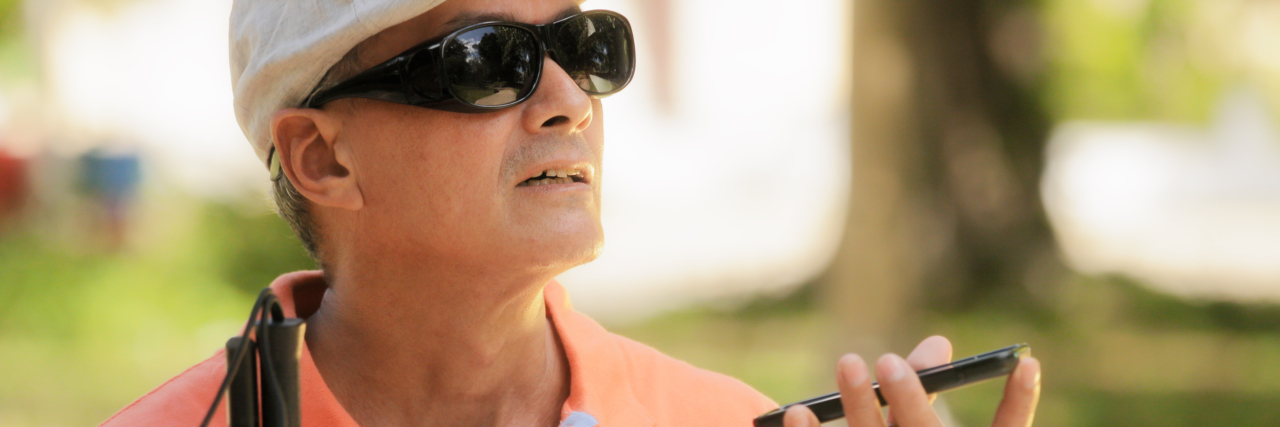As a part of my professional work, I am fortunate enough to have the opportunity to provide sensitivity training to agencies that wish to learn more about how to better embrace inclusion. As a part of the training package our organization provides, I do a section called “ask me anything.” Yes, this literally means folks ask me anything, and I am OK with that. I am not saying that approach is for everyone, but for me, knowledge is power and being able to provide a platform for myths and misconceptions to be dispelled is a huge privilege — one not enough of us are afforded.
I recently presented to a group of healthcare providers at a community health center. After I presented the formal portion of the talk (primarily on barriers experienced by individuals living with vision loss when accessing community programs) I started the “ask me anything” portion of the evening. One of the questions came from a woman who was clearly impacted by the presentation and who wanted to take this knowledge to be a better provider; her question has stuck with me in the weeks since that seminar.
She asked:
“Is part of the problem the fact that we as able-bodied individuals impose our own fears of acquiring a disability onto those living with a disability, and do you think that is what creates lowered expectations for persons with disabilities? When facing the embodiment of that fear, do we project our fears onto that person because their reality scares us?”
I had to pause and think.
The reality is, we all as human beings have things that scare us. Some of us are afraid of heights, while others can climb the CN Tower. Some of us love traveling, while the idea of leaving the comforts of home is terrifying to others. There are gourmet chefs out there who know people who are afraid of burning the house down if they turn on the stove. Whether fear is rational or not, it’s there, and fear is human.
How does it relate to disability?
It seems that fear of one’s own disability – because it could happen to anyone – is often projected onto the person living that life.
You are not likely at age 20 or 40 to suddenly wake up in the morning and learn you’re Caucasian rather than the African-American you always believed yourself to be. But you could conceivably find yourself either physically or mentally disabled due to any number of causes, from medical misdiagnosis to vehicular accidents, assaults, or other biological or physiological factors.
Disability shows no favoritism; it is the only group anyone can join at any time.
To avoid the disability label, sometimes people go to extreme lengths. Disabled people frequently hear a person they are talking to say they would rather kill themselves than be disabled.
Is disability so hard, really? Or is it attitudinal barriers or the environment that disables us and makes it so difficult to have an equal playing field?
These thoughts all jumped around in my head as I stood in front of all those people. I said some of the following in response, and wish I had said more.
Fear of sudden disability onset is terrifying for just about everyone. If I woke up tomorrow and I couldn’t move my legs, I would be devastated. I would try and find out anything I could to make things different. If they couldn’t change, if my condition became permanent, I would be sad and angry and terrified. Any major life change is difficult, and people who receive a disability diagnosis will go through stages of grief and recovery and acceptance.
That is human.
What isn’t reasonable or fair is to project your human fear of going blind tomorrow onto the reality of my existence, and limit or lower your expectations of me and define my abilities and capabilities based on that fear. The resume on the table in front of you is just as present as I am sitting across from you; the two are not mutually exclusive. I’ve had years to learn and to grow, just as you have in your own way. Disability does not automatically stunt one’s emotional growth, though the prejudices and fears of others can stunt professional or academic growth for us. Fear and limited expectations can and do prevent some of us from moving forward academically, professionally and emotionally. Limiting expectations can be harmful because sadly, lots of folks with disabilities begin to believe these misconceptions and view themselves as not capable of pursuing their goals.
Your fear of imminent disability is not the reality I live with every day. If I scare you that much, is that about me? And yet I take the fall for it. My disabled friends take the fall for it. We get passed over for job after job, for opportunity after opportunity, not because we don’t have the skills, but because of someone else’s own personal fear.
It’s time to put fear where it belongs: into perspective. Just as I doubt I will ever know what it’s like to be the CEO of Apple, you may never know what it’s like to be blind. And that’s OK. You can wonder what your life would be like if you went blind tomorrow, just as I can ponder what I would do if I lost my ability to walk. But what I cannot do – and what you must not do – is to take those fears and questions and uncertainties and place them on the shoulders of those who embody that reality. Our shoulders are not meant to bear your fear, but our hands can provide help and guidance and productivity to your organization, your school or your company. Maybe in ways you would never expect.
Getty image by Diego Cerva.

